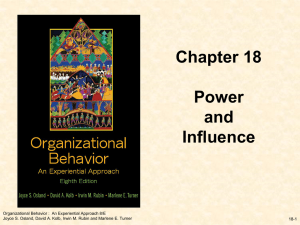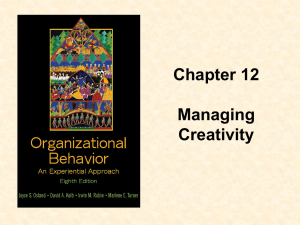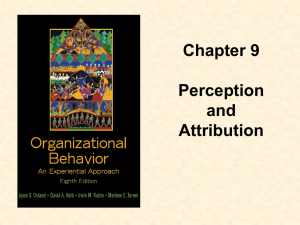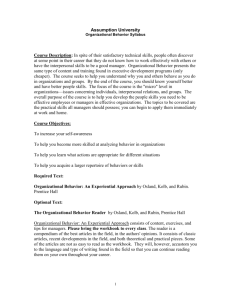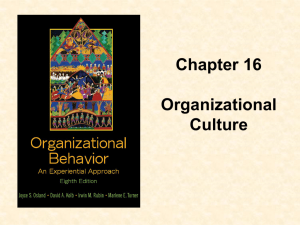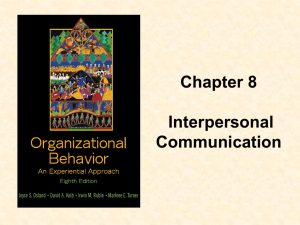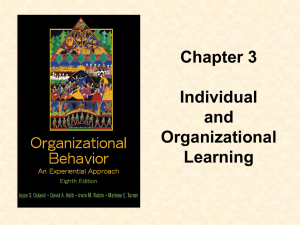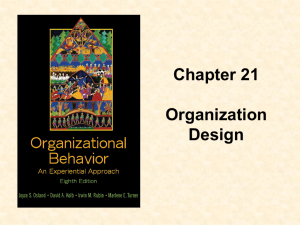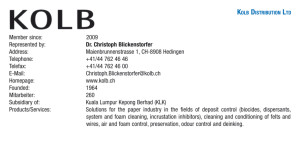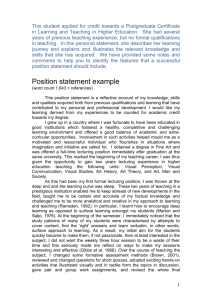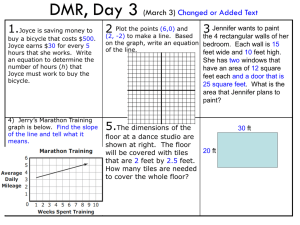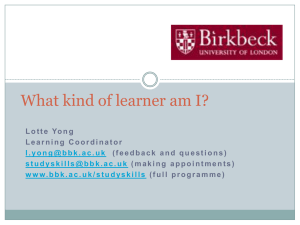Values and Workplace Ethics
advertisement
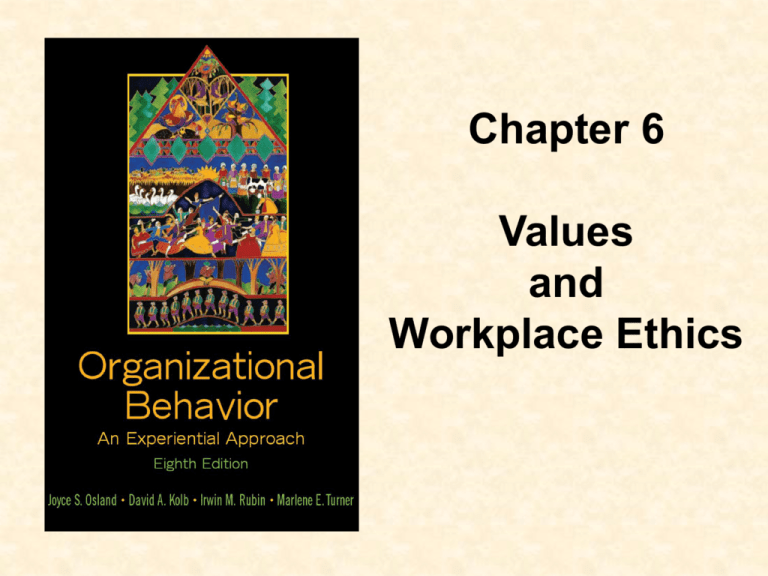
Chapter 6 Values and Workplace Ethics Objectives Describe how organizations foster unethical business Explain how organizations can promote ethical behavior Define ethics and values Better articulate your own values Organizational Behavior: An Experiential Approach 8/E Joyce S. Osland, David A. Kolb, Irwin M. Rubin and Marlene E. Turner 6 -1 …Objectives Distinguish between ethical and nonethical values Explain and recognize the stages of moral reasoning Describe five ethical models Explain corporate social responsibility and its benefits Organizational Behavior: An Experiential Approach 8/E Joyce S. Osland, David A. Kolb, Irwin M. Rubin and Marlene E. Turner 6 -2 What Was Your Score on the Corporate Integrity Checkup? Compare your score with your neighbor’s and describe your organization’s perspective on ethics Who had the highest score in the room? The lowest? Organizational Behavior: An Experiential Approach 8/E Joyce S. Osland, David A. Kolb, Irwin M. Rubin and Marlene E. Turner 6 -3 Overemphasis on individual and firm performance Sole objective is profit Intense internal and external competition “Letter of the law” rather than the “spirit of the law” Unethical Business Practices Ambiguous “window-dressing” policies Organizational Behavior: An Experiential Approach 8/E Joyce S. Osland, David A. Kolb, Irwin M. Rubin and Marlene E. Turner 6 -4 Inadequate controls Expediency reigns Indifference to customers’ best interests Failure to understand public’s ethical concerns Unethical Business Practices “Let the buyer beware” Groupthink mentality Organizational Behavior: An Experiential Approach 8/E Joyce S. Osland, David A. Kolb, Irwin M. Rubin and Marlene E. Turner 6 -5 How to Foster Ethical Behavior Communicate expectations and define what ethical behavior means Hire top executives who set a good example Reward ethical behavior and punish unethical behavior Teach the tools of ethical decision making Encourage discussion of ethical issues Organizational Behavior: An Experiential Approach 8/E Joyce S. Osland, David A. Kolb, Irwin M. Rubin and Marlene E. Turner 6 -6 The Ethics Warning System Golden Rule – Are you treating others as you would want to be treated? Publicity – Would you be comfortable if your reasoning and decision were on the front page of tomorrow’s newspaper? Kid on your shoulder – Would you be comfortable if your children were observing you? Organizational Behavior: An Experiential Approach 8/E Joyce S. Osland, David A. Kolb, Irwin M. Rubin and Marlene E. Turner 6 -7 Ethics - Defined Standards of conduct that indicate how one should behave based on moral duties and virtues arising from principles about right and wrong Organizational Behavior: An Experiential Approach 8/E Joyce S. Osland, David A. Kolb, Irwin M. Rubin and Marlene E. Turner 6 -8 Values - Defined Core beliefs or desires that guide or motivate attitudes and actions The Toyota Way Organizational Behavior: An Experiential Approach 8/E Joyce S. Osland, David A. Kolb, Irwin M. Rubin and Marlene E. Turner 6 -9 Terminal Values - Defined Desirable end states of existence or the goals that a person would like to achieve Two types: personal and social values Organizational Behavior: An Experiential Approach 8/E Joyce S. Osland, David A. Kolb, Irwin M. Rubin and Marlene E. Turner 6 -10 Instrumental Values - Defined Instrumental values are preferable modes of behavior or the means to achieving one’s terminal values Two types: moral and competence values Organizational Behavior: An Experiential Approach 8/E Joyce S. Osland, David A. Kolb, Irwin M. Rubin and Marlene E. Turner 6 -11 Schwartz and Bilsky’s Seven Universal Values Prosocial – Active protection or enhancement of the welfare of others Restrictive conformity – Restraint of actions and impulses likely to harm others and to violate sanctioned norms Enjoyment – Pleasure, sensuous and emotional gratification Organizational Behavior: An Experiential Approach 8/E Joyce S. Osland, David A. Kolb, Irwin M. Rubin and Marlene E. Turner 6 -12 …Schwartz and Bilsky’s Seven Universal Values Achievement – Personal success through demonstrated competence Maturity – Appreciation, understanding, and acceptance of oneself, others, and the surrounding world Self-direction – Independent thought and action—choosing, creating, exploring Security – Safety, harmony and stability in society, identity groups, relationships and self Organizational Behavior: An Experiential Approach 8/E Joyce S. Osland, David A. Kolb, Irwin M. Rubin and Marlene E. Turner 6 -13 Ethical Vs. Non-ethical Values Ethical—Related to what is right and proper Trustworthiness, respect, responsibility, justice and fairness, caring, civic virtue, and citizenship Organizational Behavior: An Experiential Approach 8/E Joyce S. Osland, David A. Kolb, Irwin M. Rubin and Marlene E. Turner 6 -14 …Ethical Vs. Non-ethical Values Non-ethical—Related to things we like, desire, or find personally important Money, fame, status, happiness, being liked Organizational Behavior: An Experiential Approach 8/E Joyce S. Osland, David A. Kolb, Irwin M. Rubin and Marlene E. Turner 6 -15 Kohlberg’s Three Levels of Moral Development Level One—Self-Centered (Preconventional) Stage One: Obedience and Punishment Orientation Stage Two: Instrumental Purpose and Exchange Level Two—Conformity (Conventional) Stage Three: Interpersonal Accord, Conformity, Mutual Expectations Stage Four: Social Accord and System Maintenance Level Three—Principled (Postconventional) Stage Five: Social Contract, Individual Rights Stage Six: Universal Ethical Principles Organizational Behavior: An Experiential Approach 8/E Joyce S. Osland, David A. Kolb, Irwin M. Rubin and Marlene E. Turner 6 -16 Five Ethical Approaches Utilitarianism – greatest good for greatest number Individual Rights – personal entitlements Justice – fairness, equity, impartiality Caring – well-being of other people Environmentalism – stewardship of the earth Organizational Behavior: An Experiential Approach 8/E Joyce S. Osland, David A. Kolb, Irwin M. Rubin and Marlene E. Turner 6 -17 International Ethics Making ethical decisions is even more difficult in international business due to different value systems and practices Example: Different attitudes toward bribery But ethical behavior is a competitive advantage because it builds trust Organizational Behavior: An Experiential Approach 8/E Joyce S. Osland, David A. Kolb, Irwin M. Rubin and Marlene E. Turner 6 -18 Corruption - Defined “The abuse of public power for private gain” Out of 159 countries evaluated for the 2005 Corruption Perceptions Index, 70 countries have high levels of corruption Corruption correlates with high power distance and achievement cultures, sociopolitical instability, and the absence of a tradition of well-established law and order Organizational Behavior: An Experiential Approach 8/E Joyce S. Osland, David A. Kolb, Irwin M. Rubin and Marlene E. Turner 6 -19 Corporate Social Responsibility - Defined “ CSR is broadly defined as a company’s commitment and contribution to the quality of life of employees, their families and the local community and society overall to support sustainable economic development” Provides a competitive advantage in business and in attracting and retaining employees Organizational Behavior: An Experiential Approach 8/E Joyce S. Osland, David A. Kolb, Irwin M. Rubin and Marlene E. Turner 6 -20 When Is Whistle Blowing Legitimate? It would benefit the public interest The revelation is of major importance and very specific The facts have been checked and rechecked for accuracy All other avenues within the organization have been exhausted The whistleblower is above reproach and has nothing to gain personally by revealing the info Organizational Behavior: An Experiential Approach 8/E Joyce S. Osland, David A. Kolb, Irwin M. Rubin and Marlene E. Turner 6 -21 Ways of Handling Unethical Behavior Sabotaging or refusing (quietly or vocally) to implement unethical behavior Indicating your unwillingness to support a cover-up in case the wrong-doers are caught Organizational Behavior: An Experiential Approach 8/E Joyce S. Osland, David A. Kolb, Irwin M. Rubin and Marlene E. Turner 6 -22 ...Ways of Handling Unethical Behavior Secretly or publicly blowing the whistle within the organization Secretly or publicly threatening the offender or a responsible higher-level manager with blowing the whistle inside or outside the organization Secretly or publicly blowing the whistle outside the corporation Organizational Behavior: An Experiential Approach 8/E Joyce S. Osland, David A. Kolb, Irwin M. Rubin and Marlene E. Turner 6 -23
